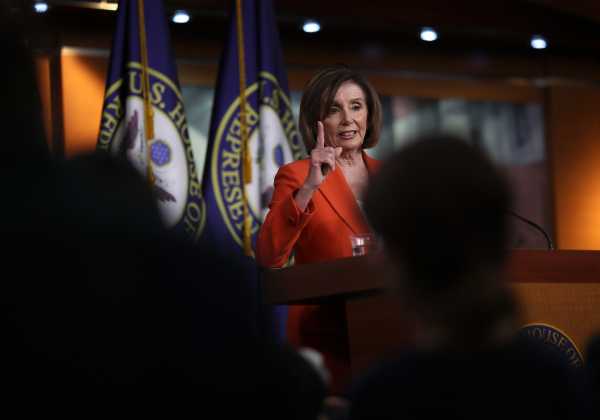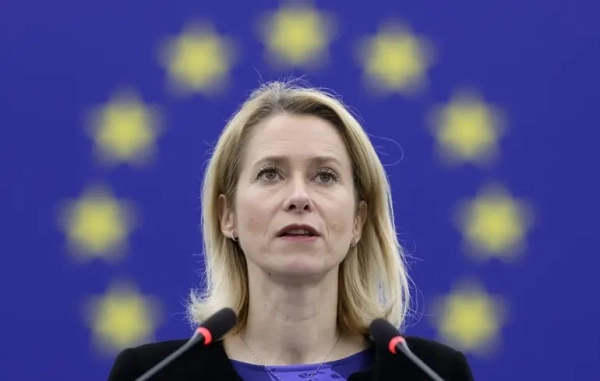
The United States has some of the highest prescription drug prices in the world, and this summer, Democratic House leadership will unveil a plan to fix that — though questions remain about just how effective this measure will be.
Reducing prescription drug prices was a key plank of House Democrats’ platform during the 2018 midterms. More than six months into their term, however, a concrete bill has yet to emerge from House leadership on the subject, and early excerpts Speaker Nancy Pelosi has floated have spurred progressive concern.
Curbing the rise of prescription drug prices is a problem that Democrats have wanted to solve for some time. Because of the way the industry is currently regulated, many pharmaceutical companies have established a monopoly on certain drugs and have significant leeway when it comes to determining costs for their medications.
As a result, the US boasts some of the highest prescription drug prices of any developed country, leading to shocking costs for thousands of drugs including insulin. Most recently, a gene therapy treatment from Novartis was priced at a whopping $2.1 million.
Despite Democrats’ consensus about the problem and the broad way to solve it (more government regulation), there’s disagreement among lawmakers about the best route to take.
Although Pelosi’s bill is not yet finalized, she has laid out some general outlines at various caucus meetings, including some recent updates that responded to progressive pushback: According to the pieces she’s revealed so far, the bill would enable Health and Human Services Secretary Alex Azar to negotiate on prescription drugs covered by Medicare, but a final price would be decided by the Government Accountability Office if no agreement could initially be reached.
That approach differs significantly from two other bills, one introduced by Rep. Ro Khanna (D-CA) and Sen. Bernie Sanders (I-VT), the other by Rep. Lloyd Doggett (D-TX) and Sen. Sherrod Brown (D-OH). Doggett and Brown’s legislation, which has garnered the support of the Congressional Progressive Caucus, would not include a GAO middle-man in negotiations. Additionally, it would enable a pharmaceutical company’s competitors to produce a generic version of a drug if a firm did not engage in negotiations fairly.
A key difference in the Democrats’ options — of involving a third party in the negotiations, even if it’s a government body — has been a point of contention, due to concerns about how this added step might make the process clunkier, while also limiting potential price reductions.
To top it all off, progressives argue that the process for developing this bill has been opaque — although they’ve been heartened by the latest tweaks by House Leadership, Politico reports. According to a senior Democratic aide, the heads of the two major committees with jurisdiction over the legislation have been making the rounds with different Democratic constituencies as they try to flesh out the proposal.
“We need the same type of transparency in writing drug pricing legislation as for pricing drugs,” Doggett told Vox in a statement.
As lawmakers await the final version of a bill spearheaded by Pelosi, there are still outstanding questions about whether it will be ambitious enough.
The HHS Secretary isn’t currently allowed to negotiate prescription prices directly
House Democrats’ legislation, whatever form it winds up taking, is intended to address a major problem they see in the way prescription drug negotiations work.
Under current law, the HHS Secretary is barred from directly negotiating the prices of prescription drugs covered by Medicare, an arrangement established in 2003 as part of the Medicare Modernization Act that set up Medicare’s prescription drug benefit. Presently, private plans that offer Medicare Part D benefits negotiate drug costs independently. But they often lack the leverage to secure the kinds of reductions the government may be able to obtain, given its bargaining power.
Proponents of changing this system argue that the federal government could have significantly more sway if it was directly involved in pricing discussions, especially because Medicare beneficiaries represent roughly a third of prescription drug expenditures on an annual basis. They point to the Department of Veterans Affairs, which negotiates prescription drug prices for both retired and active troops in the US military, and is able to obtain medicines at a major discount compared to the rest of the market.
Pharmaceutical companies counter that drug prices reflect the high costs of research and development that go into producing groundbreaking medicines. And, historically, Republicans have argued that the government shouldn’t get more involved in determining prices anyway.
In 2016, however, President Donald Trump signaled that he was interested in changing the 2003 law as well. At the time, Trump argued that the government needed to get involved in reducing prescription drug prices, a stance the GOP has previously pushed against.
Because of Trump’s position, Pelosi has repeatedly suggested that this issue is one of the few areas where Democrats could potentially work with him to get legislation through Congress. If they were successful, it’s something both Democrats and the president could tout as a substantive bipartisan achievement.
What we know about the Pelosi bill — and the two big reasons it’s raised progressive ire
At the moment, the final version of the Pelosi bill is still in flux, though an official rollout is expected in the coming months. As HuffPost’s Zach Carter and Daniel Marans previously reported, the contours of the proposal as described during a caucus meeting in late May had spurred outcry from progressives who argued that the legislation didn’t go far enough to hold pharmaceutical companies accountable. Pelosi more recently signaled that she was making updates to the proposal in response to the critiques it’s received, the Hill’s Peter Sullivan reports.
Here’s what we know about the speaker’s plan so far, though these pieces have not been finalized:
- It would enable HHS Secretary Azar to negotiate with pharmaceutical companies on the prices of drugs covered by Medicare.
- If the companies and HHS are not able to reach an agreement, the Government Accountability Office — an independent agency that conducts research and advises Congress — would help set a final price. (This is different from a binding arbitration process that had been proposed by the House speaker in an earlier version of the measure.)
- As a reference point for price-setting, GAO would use the median pricing for a particular drug in other countries around the world.
- The plan is calling for negotiations that target roughly 250 drugs, though it does not cap the number of drugs that would be part of negotiations.
- If a company does not comply with the negotiations for a particular drug, it would be penalized with an excise tax of 50 percent of its sales on the drug from the previous year.
While the GAO is seen as a better option than a third-party private arbiter (something that had been floated in prior talks) by critics of the leadership plan, there’s a lot of unanswered questions about how exactly the body would handle this job. The GAO is usually tasked with delivering oversight and other reports on government activities, not managing government negotiations.
“If the GAO is provided with the resources to construct an in-house unit to do this, that’s definitely possible,” says Rachel Sachs, a law professor at Washington University at St. Louis. George Mason University health policy professor Len Nichols agreed that GAO was “certainly capable,” though he noted that guidance from health economists would be crucial.
The role that GAO could potentially play is not the only part of the proposal that’s prompted questions, however.
The idea of a drug minimum has also emerged as another point of contention. Previously, Pelosi had suggested a 25-drug floor, though the speaker has since said her plan would aim to target about 250 drugs. Critics had expressed worries that any number set by the legislation would instead become a de facto maximum, and negotiations would peter out once an agreement was reached on a select number of drugs.
Advocates in favor of establishing a drug floor suggest that it would force the HHS secretary to engage in negotiation on a set list of drugs, at the very least, and also argue that it would be very tough for Medicare to start this process without working on a more narrow universe of drugs first.
“The discussion should be around trying this with a limited amount of drugs to start with, then you figure out what infrastructure is needed and how it’s going to work,” University of Pittsburgh health policy professor Walid Gellad tells Vox.
“Even proponents of ideas that aren’t limited in any numerical fashion would agree that prioritization is important. It just won’t be possible for an administration to negotiate all drugs in the first year,” says Sachs.
Progressives are also worried about pharma accountability
Beyond the mechanics of the negotiations, one of progressives’ biggest concerns is whether the bill has an adequate backstop that will ding companies with a financial penalty if they don’t comply with the process.
Pelosi’s proposal does have some safeguards, as HuffPost reports:
Doggett’s bill, however, which has more than 100 cosponsors, takes a much more aggressive tack on the matter.
If companies did not treat negotiations fairly, Doggett’s bill would enable HHS to issue licenses to competitors who would be able to produce the same drug as a generic, effectively eliminating a company’s monopoly on a particular drug.
This approach would push companies to approach negotiations around drug pricing more seriously — and make sure that patients could still access a particular drug even if the company manufacturing it opted out of negotiations.
It’s not just a difference of policy
As has been the case in many clashes between progressives and House Leadership, some of the tension in recent months has been fueled by the process behind the legislation’s rollout.
Many progressives had previously said they felt like there’s been a startling lack of communication as the bill has been developed. “People have not been included,” Congressional Progressive Caucus co-chair Mark Pocan (D-WI) told Politico’s Adam Cancryn in early June. “There has been no process up to now.”
House leadership is seemingly taking more progressive feedback into account, however. This past week, Pelosi’s decision to target roughly 250 drugs is evidence of that, and it’s a move that’s since been heralded by CPC co-chair Rep. Pramila Jayapal (D-WA), Politico reports.
“Leadership and the committees of jurisdiction continue to solicit feedback and incorporate ideas from across the Caucus in order to develop the strongest, boldest possible legislation to lower prescription drug prices for all Americans,” Pelosi spokesperson Henry Connelly told Vox.
Democratic leadership has also been in talks with staffers at the White House for months, given Trump’s interest in working on the issue. It makes for some confusing optics, but some experts argue that such collaboration is vital for getting anything passed and signed into law. A senior Democratic aide told Vox that the conversations with the White House that focus on this subject have simply been discussions and not negotiations.
Still, the openness to working alongside Trump on the issue — even as the administration flagrantly obstructs other Democratic efforts and investigations — has prompted some on the left to question whether he even has the capacity to be a reliable partner.
“Let’s live up to that promise and not go small in an attempt to satisfy a president who cannot be satisfied,” Doggett has said. “After Trump’s recent tantrum on infrastructure, it seems unlikely that we can count on any purported administration legislative endorsement.”
The future of this bill is up in the air
Reducing prescription drug prices — much like tackling surprise medical bills — is an issue that has widespread voter support, which makes it more likely that something could actually make it through a divided Congress.
According to a 2018 poll from Kaiser Family Foundation, 96 percent of Democrats support giving the government the ability to negotiate directly in order to reduce drug prices for those on Medicare, while 92 percent of Republicans feel the same.
Bringing drug prices down would be a clear political victory for lawmakers on both sides of the aisle. And Trump’s interest in working on this issue has provided Republicans some cover to back away from their historic position of protecting pharmaceutical business interests, says Brendan Buck, a partner at Blue Engine Media, who had previously advised former House Speaker Paul Ryan.
“The president has totally shuffled the politics on this issue in a way that’s pretty remarkable,” he told Vox. “The new willingness for Republicans to take on drug companies just didn’t exist five years ago.”
Buck added, however, that White House support on a bill may not be enough to win over Senate Republicans.
“I caution the idea that [Democrats] can work just with the White House, not because of unreliability, but just because the Senate cares a lot about this,” he said, adding, “There is no outcome on drug pricing that the Progressive Caucus will endorse that Mitch McConnell will put on the floor.”
That tension has repeatedly put House Democratic leaders in a tough spot, and it could ultimately be evident in whatever bill the speaker finally unveils.
On the one hand, Democratic leaders are interested in securing a bipartisan win, which could mean a bill with concessions that both Trump and Republicans will accept, according to HuffPost. On the other, progressive activists and lawmakers are pushing for a proposal that would send a strong message about drug pricing, though such legislation may not become law soon.
“With the current configuration of the Senate, you’re not going to get legislation through there that’s aggressive enough to make a lot of people happy in the Democratic side,” Nichols said. “I don’t think we’re talking about legislation that will actually pass the Senate.”
Other smaller reforms — like the CREATES Act, which targets tactics pharmaceutical companies use to deter competition, and recently passed the House — appear to still have a chance, however.
Given that context, progressives are wondering why Democratic leaders don’t just push for the more ambitious option to begin with, and go from there.
“We will fight it out and get it done as soon as we can,” says Public Citizen’s Peter Maybarduk. “Let’s not come up with something that doesn’t fix the problem.”
Sourse: vox.com






